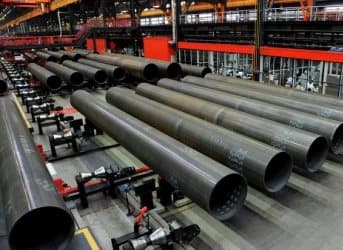The recent deal between China National Petroleum Corporation (CNPC) and Russian energy company Gazprom has the potential to counterbalance U.S. energy sanctions and broaden Russia’s energy options in Eurasia. The parties have contracted to build the new “Power of Siberia” pipeline over the course of the next five years. The goal is to supply China with 82 billion cubic meters of gas, or an average of 16.4 billion cubic meters per year. In addition, the Russian minister of energy, Alexander Novak, has said the Chinese side expressed a desire to advance up to $25 billion and to abolish import duties on Russian gas.
According to Vedomosti, the Russian version of The Wall Street Journal, the contract between Gazprom and CNPC is worth a total of $400 billion and covers 1.032 trillion cubic meters of gas. The price of the contract is based on the minimum volume and includes a “take or pay” provision. The contract is fully in keeping with Gazprom’s corporate strategy to diversify its fuel shipments. Essentially, it is no different from similar agreements made with Western European consumers and the price is competitive (above $350 per thousand cm., according to various sources). The Chinese state has tasked CNPC to build pipelines and storage facilities in China under the deal.
By the end of 2014, an additional intergovernmental agreement on energy cooperation may be signed at the state level. Speaking on the feasibility of the project, Alexey Ulyukaev, the Russian minister of economic development, claimed at the recent St. Petersburg International Economic Forum that “the project is certain to be 100 percent profitable.” Moscow is considering the introduction of preferential tax treatment to make the deal even more lucrative. A new tax relief scheme will be introduced on the fields that serve as the source for supplying gas to the Chinese market.
On a broader scale, quick accomplishment of the deal may be a direct consequence of current U.S. policy in the Eastern Europe. After the Syrian fiasco, the Obama administration threw all its efforts into establishing a puppet regime of nationalists in Ukraine. The export of chaos in the heart of Europe was meant to disharmonize East-West energy dialogue. Following Washington’s scenario, the foreign ministers of France, Germany, and Poland forgot the ancient principle of pacta sunt servanda and violated the treaty with the then-legitimate president of Ukraine. This, de facto, sanctioned civil war and brutal violence in Novorossia.
Related Article: China, Russia and East Siberian Natural Gas
The installation of a radical government in Kiev put at risk the whole system of energy supplies to Europe. By now it seems that no one in Europe can offer an intelligible explanation why it happened. Brussels has sacrificed decades of energy stability to the myth of U.S.-EU transatlantic solidarity (problem-plagued TTIP negotiations are a good benchmark here). Now the looming threat of Ukraine’s unsecured gas debt is one of Europe’s high-priority problems. Who has reaped the benefits of the dubious Western “victory” in Kiev? Just follow the money. While U.S. Vice President Joe Biden was testing the loyalty of America’s Eastern European satellites in Romania, his son, Hunter Biden, unabashedly joined the board of directors of Ukrainian natural gas company Burisma.
Reorientation of Russia’s energy policy to Asia will hardly bring about a dramatic change in the short term. Europe is and will remain an important trade partner for Russia’s natural gas exporters. Although the planned shipments of 38 billion cubic meters of gas to China are impressive, they amount to only about 20 percent of what is currently being provided to Europe.
However, in 2020-2025 perspective Russia-China gas deal will make the market for natural gas in China. The absolute numbers are not as important as the total economic impact of long-term cooperation. For example, the Chelyabinsk Tube Rolling Plant (ChelPipe) and CNPC subsidiary China Petroleum Pipeline Material and Equipment Corporation (CPPMEC) have signed a two-year agreement for joint participation in international pipeline projects.
The east Siberian fields will also supply a planned liquefied natural gas plant in Vladivostok, which could become a gateway to other energy-hungry Asian countries such as Japan, Korea and Taiwan. All things considered, Fitch rating agency believes that the CNPC-Gazprom deal represents a significant growth opportunity for the Russian gas sector. An alternative market in the East will be positive for Gazprom’s medium-to-long-term prospects, despite all attempts to impose economic sanctions on Russia.
ADVERTISEMENT
By Igor Alexeev


















